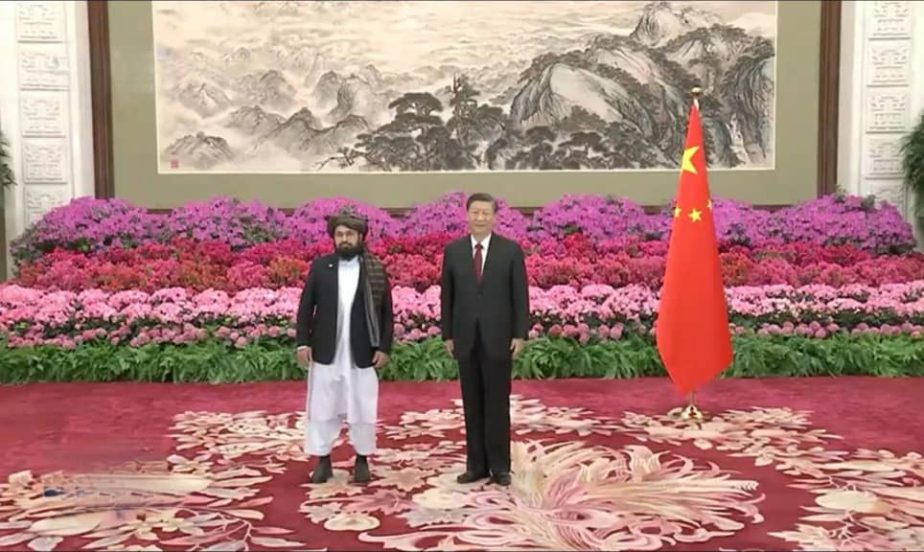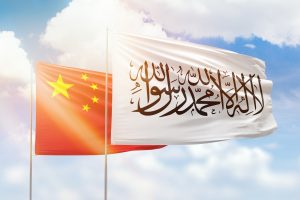China has long had its eyes on Afghanistan, often referred to as the “Saudi Arabia of lithium,” and it has now officially accepted an ambassador representing the Taliban government.
The move was met with a warm reception from Taliban officials and their supporters. Afghan social media platforms were inundated with images capturing the moment on January 30 when the Taliban’s ambassador, Mawlawi Asadullah, and Chinese President Xi Jinping, exchanged a handshake in the Great Hall of the People in Beijing, set against a backdrop of fresh flowers.
The title “Mawlawi” is commonly used as a prefix in various Islamic societies, especially in South Asia. It signifies an individual who has achieved a certain level of proficiency in Islamic theology and jurisprudence.
Abdul Qahar Balkhi, the spokesperson of the Foreign Ministry in Kabul, officially announced on X, formerly Twitter, that Asadullah, also known as Bilal Karimi on social media, was appointed as the Ambassador Extraordinaire and Plenipotentiary of the Islamic Emirate of Afghanistan to China during a special ceremony alongside envoys from 41 other countries.

In this photo provided by the Taliban’s Foreign Ministry, Chinese President Xi Jinping poses for a photo with Ambassador Mawlawi Asadullah after accepting his credentials as the ambassador of the Islamic Emirate of Afghanistan to China, Jan. 30, 2024.
On January 31, Chinese Foreign Ministry spokesperson Wang Wenbin was asked if receiving Asadullah’s credentials as the Taliban’s ambassador signified formal recognition of the Taliban government – something no state has offered yet. Wang demurred, calling the move a “normal diplomatic arrangement” while emphasizing the nominally “interim” state of the Taliban government.
“We believe that diplomatic recognition of the Afghan government will come naturally as the concerns of various parties are effectively addressed,” Wang said. However, even while urging Afghanistan to “further respond to the expectations of the international community,” he also insisted that “Afghanistan should not be excluded from the international community.”
Wang’s statement highlights the complex yet amicable China has relationship with the Taliban. Meetings between representatives from both sides both preceded the Taliban’s assumption of control in Afghanistan and persisted thereafter.
China’s interest in Afghanistan encompasses not only the allure of the country’s extensive underground wealth and abundant minerals but also strategic geographical proximity. Moreover, China’s Afghanistan policy is influenced by an age-old problem: the predicament of autonomy-seeking Turkic Muslims along the border with Afghanistan.
China Eyes Afghanistan’s Mineral Wealth
The Brookings Institution previously addressed the surging speculation that China would exploit the power vacuum created by the United States’ 2021 departure from Afghanistan, aiming for control over the nation’s mineral resources, notably focusing on lithium deposits. The Brookings report underscored the risks posed by China’s recent actions to Western powers. These concerns are particularly pronounced now as the United States and other major Western nations redirect their attention to the Middle East, possibly leaving South Asia in a state of uncertainty.
Reportedly, delegates from diverse Chinese companies conducted on-site inspections to assess potential lithium projects in Afghanistan in November 2021. In April 2023, the Taliban announced that Gochin, a Chinese battery company, aimed to enter a $10 billion contract for lithium extraction in Afghanistan.
However, a Chinese Foreign Ministry spokesperson claimed no knowledge of the deal. The United States’ Special Inspector General for Afghanistan Reconstruction (SIGAR) reported on January 28, via a series of messages on X, that the U.S. State Department in the last quarter of 2023 that “no agreements have been signed.”
That could change as China slowly expands its ties with the Taliban government.
In a 2010 memorandum, the Pentagon’s Task Force for Business and Stability Operations, tasked with assessing Afghanistan’s development potential, characterized the country as the “Saudi Arabia of lithium.”
While lithium is not particularly scarce in the Earth’s crust, commercially viable deposits that can be economically extracted are less common. Lithium plays a crucial role in the global transition toward renewable resources and the reduction of dependence on fossil fuels.
Lithium-ion batteries are widely used in portable electronic devices (such as smartphones and laptops) and electric vehicles. They are preferred for their high energy density, lightweight nature, and long cycle life. Lithium-ion batteries are a key component in the propulsion systems of electric vehicles, contributing to the growth of the electric vehicle market. Lithium-ion batteries also play a crucial role in storing energy generated from renewable sources like solar and wind, providing a stable supply when renewable energy production fluctuates.
Considering China’s already-prominent role in the exploitation of critical minerals, particularly in less affluent Asian and African nations, potential Chinese mining activities in Afghanistan give rise to various concerns.
The Xinjiang Factor
In addition, fostering a cooperative relationship with the Taliban, who now control an Islamic Emirate on China’s borders, appears to be a strategic maneuver aimed at mitigating potential concerns and ensuring stability.
China has long harbored concerns that Uyghur Muslims, who are native to the region officially known as the Xinjiang Uyghur Autonomous Region, will seek to violently win their independence. The Chinese government has faced accusations of orchestrating a large-scale, systematic campaign of human rights violations against Turkic Muslims in Xinjiang, situated in northwestern China near the border with Afghanistan.
In October 2023, 51 United Nations member countries issued a collective declaration condemning the Chinese government’s alleged crimes against humanity targeting Uyghurs and other Turkic Muslim communities. The declaration called on Beijing to cease its systematic human rights abuses in the Xinjiang region.
Human Rights Watch echoed the plea.
China claims its actions are a necessary part of counterterrorism work, and it has found no shortage of foreign governments – including many in the Muslim world – willing to back its position to stay on Beijing’s good side.
China’s growing proximity to the Taliban may reduce the likelihood of Uyghur and other Turkic Muslims seeking support from Afghanistan based on the Islamic virtues of solidarity and cooperation.
China expresses specific concerns regarding separatist movements like the East Turkestan Islamic Movement (ETIM), also known as the Turkestan Islamic Party. The Chinese government designates ETIM as a terrorist organization, and its activities have been a point of contention between China and Afghanistan.
For example, Hasan Mahsum, a Uyghur separatist leader and the founder of ETIM, sought refuge in Afghanistan in the late 1990s during the Taliban’s rule (1996–2001). In December 2023, Pakistan’s military reported that Hasan Mahsum, recognized by China as a top “terrorist,” was killed during an army operation in Waziristan, along Afghanistan’s de facto border with Pakistan.
Sources on the ground in Afghanistan told RFE/RL that the Taliban had forced fighters affiliated with ETIM to relocate away from the border with China into areas farther south.
Where China Goes, Will Others Follow?
While the acceptance of the Taliban’s ambassador in Beijing does not indicate official recognition of the Islamic Emirate of Afghanistan, China is pushing the boundaries of diplomatic engagement. Now the question is whether China’s close ties with the Taliban will be emulated by Pakistan, which has refrained from recognition, and other countries in the region.
Even if no other country follows China’s example, it is undeniably a highly beneficial move for the Taliban.
Since seizing control of Afghanistan in August 2021, the Taliban have grappled with severe economic challenges. The departure of almost all international aid groups and NGOs has resulted in widespread unemployment and escalating hunger. Furthermore, the freezing of the country’s central bank assets and international sanctions have left Afghanistan largely isolated. The Taliban are seeking to tap into the country’s mineral resources, but such endeavors are impractical without external assistance, investment, and access to markets.
China could offer the necessary know-how, funding, and demand to make Afghanistan’s mineral wealth profitable. Opening new avenues with China would bring a significant improvement in business and trade.
Nevertheless, the extraction of Afghanistan’s mines and minerals poses formidable challenges, requiring advanced technology, labor-intensive efforts, and time. Time is a luxury the Taliban cannot afford, as the looming threats of hunger and unemployment could lead to a severe crisis.
































